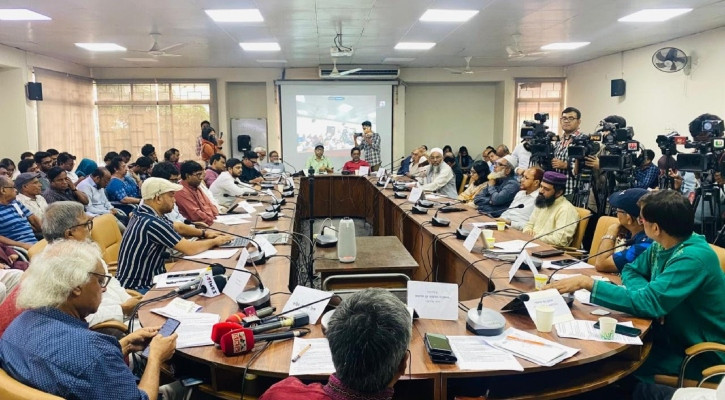
The existential crisis facing the Teesta River, exacerbated by unilateral upstream withdrawals and scientifically questionable domestic planning, was the focal point of a high-level discussion meeting organized jointly by the Bangladesh Poribesh Andolon (BAPA) and the Bangladesh Environment Network (BEN). Held on Sunday, November 2, 2025, at the seminar hall of the Press Institute Bangladesh (PIB) in Dhaka, the event brought together environmental scientists, economists, and political leaders to critically evaluate the current trajectory of river management under the banner “Teesta River in Crisis: What is the Path to Solution?”. The overarching consensus emerging from the deliberation was a rejection of infrastructure projects that compromise ecological integrity, with a forceful demand for the re-evaluation of the proposed Teesta River Comprehensive Management and Recovery Plan (TRCMRP) in favor of a sustainable, basin-wide solution.
Presenting the keynote paper, Professor Dr. Md. Khalequzzaman, Vice-President of BAPA and Global Coordinator of BEN, identified the lack of a water-sharing treaty with India as the primary driver of the Teesta’s degradation. He noted that as Bangladesh’s fourth-largest transboundary river, the Teesta has fallen victim to unilateral control; India continues to regulate water flow through upstream dams and hydropower projects without regard for international norms or the ecological needs of the lower riparian nation. This hydrological hegemony has resulted in a disastrous cycle: severe water scarcity during the dry season and unmanageable flooding during the monsoon, leading to heightened riverbank erosion and the collapse of local ecosystems.
Professor Khalequzzaman provided a critical technical analysis of the proposed “Teesta River Comprehensive Management and Restoration Project.” He highlighted that the project envisions narrowing the river—which currently spans up to several kilometers—to a width of merely 700 to 1,000 meters, artificially transforming a natural braided river into a straight, embankment-constrained channel. He argued that this engineering-heavy approach ignores the river’s morphological reality and risks further destabilizing the region’s ecology.
The discussion underscored a profound lack of transparency regarding government planning. Dr. Nazrul Islam, founder of BEN and former Chief of Research at the UN’s Development and Research Division, criticized the prevailing silence among policymakers. He observed that neither the government nor major political parties are willing to discuss the Teesta project openly, often due to geopolitical sensitivities involving development partners like China or diplomatic relations with India. Despite this, he reaffirmed that BAPA and BEN remain committed to highlighting these inconsistencies, asserting that the livelihoods of 20 million people in the Teesta basin cannot be held hostage to diplomatic inertia.
Echoing this sentiment, noted economist Professor Anu Muhammad argued that the government possesses no transparent data regarding the TRCMRP and condemned the trend of “development” that equates to river encroachment. “We do not want development that shrinks rivers; the river must remain a river,” he asserted, emphasizing that national interest must supersede private profit and that long-term projects require public consent rather than bureaucratic imposition. Speakers such as Dr. Matin Uddin Ahmed emphasized the urgent need for “Water Diplomacy,” arguing that ignoring the riparian reality with India to pursue isolated domestic engineering solutions is a flawed strategy.
The meeting concluded with a unified call for a paradigm shift in how Bangladesh approaches transboundary river management. Political leaders present, including Ruhin Hossain Prince of the CPB and Saiful Haque of the Revolutionary Workers Party, insisted that solutions must be derived from local experts and community consultation rather than foreign consultants. They advocated for a multilateral approach involving all basin nations, including Nepal and India, to ensure a sustainable flow regime. BAPA President Professor Nur Mohammad Talukder, who presided over the session, reiterated that while the organization is not opposed to development, it stands firmly against any initiative that jeopardizes the country’s “life-nature” and riverine ecosystems. The assembly ultimately adopted a resolution demanding the cancellation of river-shrinking projects and the immediate pursuit of a fair share of Teesta waters through international legal and diplomatic channels.

